Christopher Nolan is a modern day Alfred Hitchcock
July 16, 2010 11 Comments
I don’t know if the title of this article has ever been written before, but I would not be surprised to learn if I were not the first to commit it to text.
There are many modern filmmakers who are extremely talented, but Nolan continues to stand out because of his ability to work so well within the Hollywood system. He has been able to continuously and consistently produce excellent films both critically and financially, while making very few, if any, sacrifices to be in the Hollywood system. He has actually stated a preference toward large scale production and American film making, something scarcely heard from directors of the same caliber.
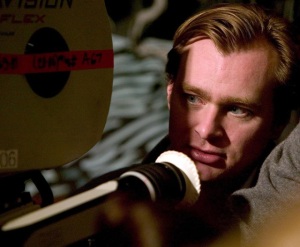
“...there's a very limited pool of finance in the UK. To be honest, it's a very clubby kind of place. In Hollywood there's a great openness, almost a voracious appetite for new people.” - Christoper Nolan
Christoher Nolan and Alfred Hitchcock share as many similarities in their film making ideas, as they don’t in their physical appearance, but they each started from very different places. Nolan began as most modern filmmakers do, by making an impression with a independent film. Nolan released Following in 1998 to great critical acclaim. Nolan financed the movie with $10 and a handshake*, but let the writing speak for itself and created a compelling noir mystery on almost no budget.
*Not the actual budget
He used Following as a commercial to help him gather investors to finance Memento, and from there went on to his first studio production, Insomnia with Robin Williams and Al Pacino. It only took two films under his belt to work with such respected actors, not a claim many directors can make.
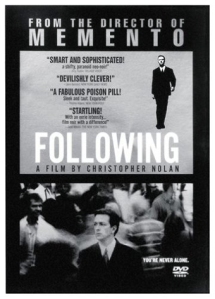
“We've got a pretty serious claim on being the cheapest film ever made.” - Christoper Nolan on Following
Hitchcock only became actively interested in film after completing college and it took him years to make his way into a directors chair. He began by working on sets designing title cards for silent films. It was only when the director of the film, Always Tell Your Wife in 1923 became ill, that Hitchcock was able to step in and finish the project. He impressed the higher ups with his work, and was able to move on from there.
Both Nolan and Hitchcock are of European descent, and both were quick to come to America to work in the American film system. Both have been quoted as showing preference to the American style of film making, with higher budgets and higher production quality.
Nolan married his wife Emma Thomas in 1997. She has served as producer on all of his films, and is clearly a very important part of his collaborative process.
Hitchcock’s wife never held and credited roles, but he often considered her his greatest critic and an extremely important part of his collaborative process. When accepting the American Film Institute Life achievement award, Hitchcock had this to say about his wife, Alma Reville:
“I beg permission to mention by name only four people who have given me the most affection, appreciation, and encouragement, and constant collaboration. The first of the four is a film editor, the second is a scriptwriter, the third is the mother of my daughter Pat, and the fourth is as fine a cook as ever performed miracles in a domestic kitchen. And their names are Alma Reville.”
– Alfred Hitchcock
Perhaps the most obvious similarity between the two directors is their preferred genre. Hitchcock made mystery thrillers almost exclusively, and Nolan has certainly not strayed very far from the dark, noir-thriller-mystery genre. Nolan’s first film, Following, especially feels like it could fit comfortably in the stable of Hitchcock films. Themes of crime, conspiracy, mystery and just general dark stuff run rampant throughout all of the films from the two directors.
Hitchcock was an extremely detailed director taking much of his production timeframe to write and storyboard his films. He expressed disinterest in the actual shooting part of the movie, as he felt the writing, story-boarding and eventual editing as the actual film making parts of creating a movie. He considered working with the actors and shooting as nothing more than the collecting of parts to later form into a movie and once referred to actors, rather controversially, as cattle.
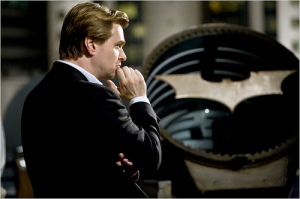
“There’s a point during production which you’re really almost doing a paint-by-numbers thing; you’re almost just fulfilling a set of creative obligations that you’ve set up for yourself in prep. So, even though some of it can be fun, and it’s where a lot of interesting and amazing things can happen, there’s a point where you just want to be done with it and get into the edit suite and mess around with what you’ve shot.” - Christopher Nolan
Nolan has expressed a similar standpoint on film-making. With The Dark Knight specifically he said he found the actually shooting be somewhat tedious.
He does not storyboard his films to the same extent as Hitchcock did, but that can be attributed to technology. Hitchcock had to rely on large cameras and cranes, so the opportunity for improvised set-ups and sudden changes were a luxury he could literally not afford. Nolan has stated that generally the only story-boarding he does is for action sequences. He does take time to work with his scripts extensively, though. His latest film, Inception is a script he has been working on for ten years.
Though both directors spend large amounts of time on the creating their films, one thing they try adamantly to hurry along is the actual film itself. Nolan likes to cross cut adjacent sequences, to build tension and hurry the pacing. He often will cut from one scene to another so quickly that he cuts off the last few syllables of character dialogue in order to hurry the film along. Hitchcock’s preference of film pacing and speed can be summed up rather succinctly in one brilliant quote.
“The length of a film should be directly related to the endurance of the human bladder”
– Hitchcock
A final similarity between the two film makers, is audience perception. Hitchcock has now become an iconic film maker, and many of his films are rightfully considered cinematic masterpieces. At the time though, he was often disregarded as a sort of pop-film maker, intentionally appealing to the masses, and not very well respected by critics of the time. He was well loved, and successful, but criticized. He never won a best director Oscar in all of his years of directing. He did win a Best Picture Oscar for his first American film, Rebecca, but Hitchcock became so separated from the film between shooting and editing, that by the time it was released, he barely considered it his own. It had been far too manipulated by the studio heads.
Nolan has had a somewhat similar experience in a few regards. For one, he has not yet received any major accolades from the Oscars. It’s likely that this will change, but many feel that Nolan deserved at least a best picture nomination for The Dark Knight. The Oscars don’t seem to have much respect for the comic book film genre, which highlights another similarity.
Hitchcock brought an air of sophistication and seriousness to a genre that was often written off by critics as nothing more than audience pleasing drivel. Nolan is arguably the first director to pursue a comic book film with the same amount of thought and serious consideration as any noir thriller, or serious dramatic film.
Hitchcock suffered a career injury after the reception of Vertigo. People did not like the film, and it was difficult for him to recover. His last few films were made outside of America with smaller budgets, and though they were good films, they were never able to reach the financial or critical level of acclaim as some of his previous masterpieces. Now he is considered a brilliant auteur, and one of the most prolific and skilled film makers of the last few decades.
There is no telling what the future will hold for Nolan, but right now it is looking much brighter than any of the shadowy sets featured in his films. Early reception for Inception has been extremely positive, and the word masterpiece has been thrown around like a batarang. Nolan seems to be on the right track, and he seems to know what he is doing. I for one can’t wait to see whats to come.
Update
Author D. H. Schleicher posted a blog discussing the similarities between Nolan and director Fritz Lang that compliments this article very well. Click this link to learn even more about Nolan’s influences.
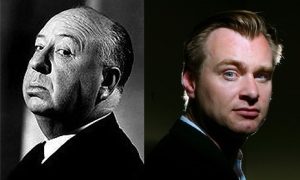
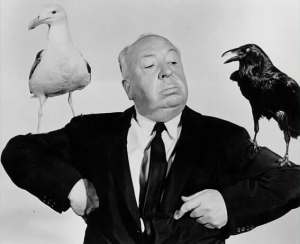
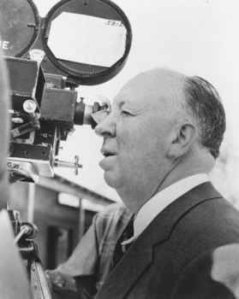
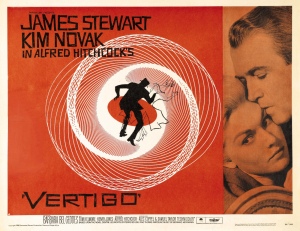
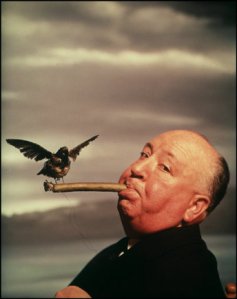
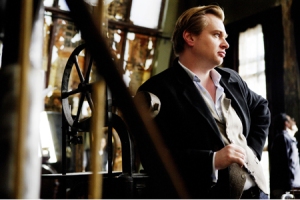
Excellent analysis! The parallels to Hitchcock are astounding.
In terms of the scope of his films (and the fact the he will never be as prolific as Hitchcock), I think Nolan is more of a modern-day Fritz Lang (which is ironic, as when Hitchcock first gained recognition, he was referred to as the British Fritz Lang).
Have you seen Inception yet?
Here’s my review you care to read on (and I also talk more about the Lang/Nolan theory) —
http://davethenovelist.wordpress.com/2010/07/16/the-inception-of-dreams/
Thanks David! I definitely agree that Nolan will never be able to be as prolific as Hitchcock, and with the Lang relationship, though admittedly, I am not as familiar with Lang as I am with Hitchcock and Nolan. I have not seen Inception yet, but I am very excited. I have my IMAX tickets already paid for and will be going tonight.
I’ll check out your review right now, as long as there aren’t any spoilers…
I go fairly in depth on the themes…but no plot spoilers! (The trailers reveal more than I do concerning details)
Great article. Hitchcock is a favorite and interesting to see the parallels. I will definitely see ‘Inception’ now. Carrie saw the midnight show and said it was mind altering. I love the picture of the two directors side by side. Good work!
This is the greatest nonsenese I ever heared off.
Pingback: Inception (Review) « Movies over Matter
Pingback: Will Inception Plant True Inspiration in Hollywood’s Future? « Flickbook
Casino roulette, the spelling errors in your argument alone demonstrates your ignorance. 😀
Pingback: The Inception of Dreams « The Schleicher Spin
I blog likewise and I’m creating a little something very close to this particular blog,
“Christopher Nolan is a modern day Alfred Hitchcock � Interminable Palaver”.
Will you care if perhaps Iuse a lot of of your own points?
Thanks for the post -Sophie
Go for it!